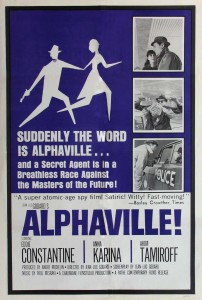 Alphaville (Jean-Luc Godard, France, 1965, 99 min)
Alphaville (Jean-Luc Godard, France, 1965, 99 min)
UW Cinematheque @ Union South Theater, , Saturday, June 28, 7pm
“Yes, I’m afraid of death. But for a humble secret agent, that’s a fact of life, like whisky. And I’ve drunk that all my life.”
—Lemmy Caution (Eddie Constantine)
Perhaps a more conventional choice, Alphaville is nevertheless my favorite Godard film. Part of my esteem for it stems from the fact that it was the first Godard film I ever saw. As a cinematic first impression, this “strange adventure of Lemmy Caution” was indelible. An existentially moving yet occasionally playful sci-fi noir—especially one with lines like the one above—the film was right up my street. As I return to it once more, the film holds up as the cynosure for all things I enjoy in Godard’s filmmaking (pre-1968, anyway; sadly, I don’t enjoy much of his work thereafter).
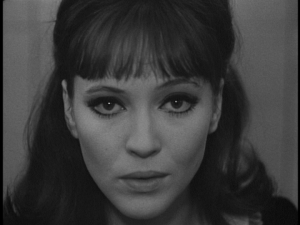
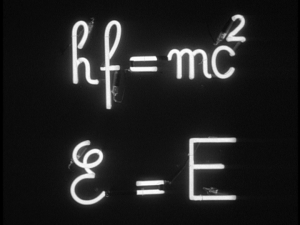 At a basic stylistic level, Godard unpacks much of his early cinematic toolbox here. Whether it is direct address of the camera breaking the “fourth wall” or the playful interaction between the image and the soundtrack, Godard continues in the technical spirit of the nouvelle vague that he helped ignite, albeit within the confines of a more conventional narrative (for him, anyway). As in Le Petit soldat and Vivre sa vie, he also spends a fair amount of time treating the audience to loving close-ups of his muse, Anna Karina. And in the editing, one finds plenty of interstitial cuts—sometimes lighthearted, sometimes weighty, but always purposive despite their spontaneity. Also on the subject of style, take a good look at the scene in the hotel room when Lemmy Caution arrives in Alphaville and how the staging works in enjoyable concert with a deft camera alternating between smooth motion and captivating stillness.
At a basic stylistic level, Godard unpacks much of his early cinematic toolbox here. Whether it is direct address of the camera breaking the “fourth wall” or the playful interaction between the image and the soundtrack, Godard continues in the technical spirit of the nouvelle vague that he helped ignite, albeit within the confines of a more conventional narrative (for him, anyway). As in Le Petit soldat and Vivre sa vie, he also spends a fair amount of time treating the audience to loving close-ups of his muse, Anna Karina. And in the editing, one finds plenty of interstitial cuts—sometimes lighthearted, sometimes weighty, but always purposive despite their spontaneity. Also on the subject of style, take a good look at the scene in the hotel room when Lemmy Caution arrives in Alphaville and how the staging works in enjoyable concert with a deft camera alternating between smooth motion and captivating stillness.
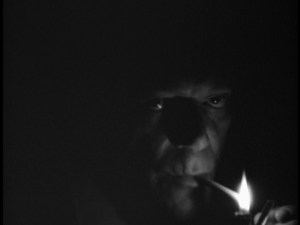 I’d also be remiss in not pointing out Eddie Constantine’s meditatively crusty performance, as well as the always welcome Akim Tamiroff, who once more displays his unerring ability to go from smile to wince at the drop of a fedora. Anna Karina is, as usual, a delight. While perhaps a slightly lesser performance than the one she delivers in Vivre sa vie, and without spoiling anything, suffice it to say that Alphaville simply would not work without her. At the level of physical performance, I must also mention the aquatic knife squad in the middle of the film. I dare say that you’ll find them some of the most memorable assassins in cinema history.
I’d also be remiss in not pointing out Eddie Constantine’s meditatively crusty performance, as well as the always welcome Akim Tamiroff, who once more displays his unerring ability to go from smile to wince at the drop of a fedora. Anna Karina is, as usual, a delight. While perhaps a slightly lesser performance than the one she delivers in Vivre sa vie, and without spoiling anything, suffice it to say that Alphaville simply would not work without her. At the level of physical performance, I must also mention the aquatic knife squad in the middle of the film. I dare say that you’ll find them some of the most memorable assassins in cinema history.
But what is truly unforgettable is the look of the film. As the great Andrew Sarris once succinctly put it, “Alphaville is science fiction without special effects.” More specifically, Godard’s futuristic milieu is one of sound and word more than image—more “psychetecture” than architecture, one might say.
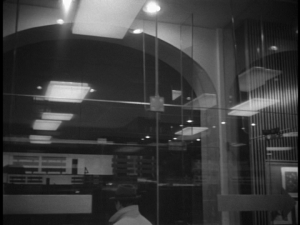
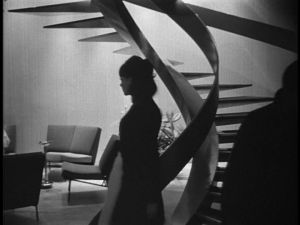 The titular city is one of almost perpetual night, full of clean lines and cold curves, but there is little else about the visual design of the film to suggest this is the future. Instead, Godard peppers his soundtrack with beeps and tones, which work together with conventional genre terms like “outlands” or “residents central registration” to fully realize the plot of a computer bankrupting a city’s residents of their emotions. Godard’s value of the philosophical over the physical gives us all we need in our mind’s eye to transform those clean lines and cold curves into a city of the future.
The titular city is one of almost perpetual night, full of clean lines and cold curves, but there is little else about the visual design of the film to suggest this is the future. Instead, Godard peppers his soundtrack with beeps and tones, which work together with conventional genre terms like “outlands” or “residents central registration” to fully realize the plot of a computer bankrupting a city’s residents of their emotions. Godard’s value of the philosophical over the physical gives us all we need in our mind’s eye to transform those clean lines and cold curves into a city of the future.
He doesn’t just want us to see this film, so much as feel our way through it, and this feeling is emblematic of Godard’s own practices as a filmmaker. Valuing improvisation over calculation (or at least a harmony between them), he simultaneously creates a highly generic and highly personal film, whose lack of visual effects results in a film of truly effective vision.
UW Cinematheque continues its sensational summer lineup with this masterpiece, and I can’t recommend strongly enough that you see this film on the big screen. Godard is famous, of course, for remarking that all one needs to make a movie is a girl and a gun. With Alphaville, he goes a step further, demonstrating that all one needs to make a new world is the right light and the right camera.